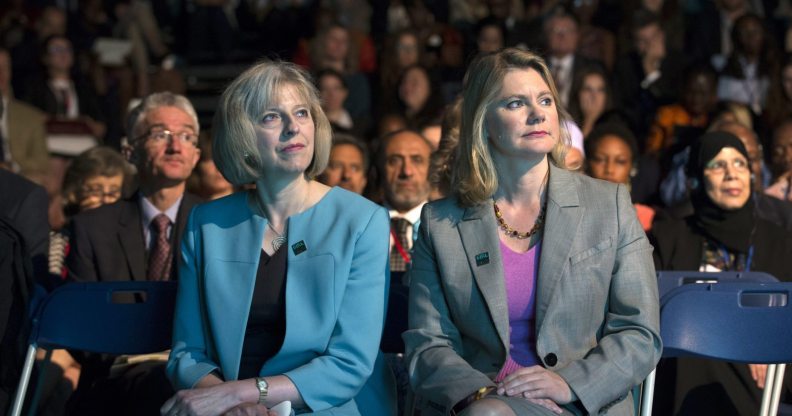Government delays transgender rights review amid right-wing press backlash

(Getty)
A review aimed at boosting rights for transgender people has been reportedly kicked into the long grass, amid a furious campaign from the right-wing press.
Earlier this year the Secretary of State for Education and Minister for Women and Equalities Justine Greening had announced plans to review the Gender Recognition Act, a 2004 law that allows transgender people to gain legal recognition.
LGBT advocates had called for the law to be streamlined to reduce the hurdles that transgender people have to jump through to get a Gender Recognition Certificate, adopting a simpler ‘self-declaration’ system that operates in Ireland and other countries across Europe.
However, the review – which was originally billed to be starting this autumn- appears to have been postponed after a furious anti-transgender backlash in the media, which has seized upon any mention of trans people.
The Sunday Times reports that a planned consultation will now not be launched until spring 2018 at the earliest, citing the issue’s “complex” and “divisive” nature.

(Chris Jepson)
The source claimed that the consultation will not be launched until after the Government Equalities Office has processed responses to the national LGBT survey, which took place earlier this year.
They told the newspaper: “We need to factor in responses to the first ever national LGBT survey, which will take a bit of time as it has had over 100,000 responses.”
The Women and Equalities Committee published a report last year that called for improvements to the Gender Recognition Act, reducing the number of medical and bureaucratic requirements for transgender people to change legal gender.
The Gender Recognition Act does not regulate who is permitted to use gender-segregated spaces, but much of the coverage of the issue has inaccurately claim that reforms would give more people permission to enter female toilets.
But in the light of the news, anti-transgender campaigners are now calling for the review to be scrapped entirely.
Tory MP David Davies, a strong opponent of transgender equality, called on Greening to axe the plan to avoid giving rights to people who are “effectively cross-dressers”.
He said: “Given the delay to this and the fact that many LGBT campaigners are opposed to this, I would urge the government to think again.
“Although there is obvious need to protect someone who is transgender from bullying and victimisation… it’s also important that we don’t allow women’s rights to be trampled on to allow those who are effectively cross-dressers to enter places, such as changing rooms, hospital wards and prisons, where women would expect privacy.”

(Photo by Matthew Horwood/Getty Images)
There have been zero reported issues since Ireland adopted a self-declaration system in 2015.
The decision to shelve the review comes after a transgender ‘moral panic’ in the media which has seen relentless weekly stories targeting transgender people.
The stream of stories have led of a flood of complaints to press regulators IPSO and Impress, but no newspaper has thus far been sanctioned for its coverage.
The Times itself published a string of articles targeting a 19-year-old transgender girl, after she was named a women’s officer by her constituency Labour Party.
The newspaper targeted Madigan for taking on the local women’s officer role and for applying for the party’s Jo Cox Women in Leadership Scheme..
A Times reporter interviewed anti-trans activists who claimed her presence is a “monstrous insult” to women.
55 female Labour activists involved in the Jo Cox Women in Leadership scheme penned a letter to the editor of The Times disputing their coverage – which the newspaper declined to publish.
The group added: “One of our cohort is a trans woman, our friend, and our sister.
“We wish to make it clear that the decision to include all women in this programme is one we supported then, and one which we support now.”
Speaking at the PinkNews Awards earlier this year, Prime Minister Theresa May had vowed to push on with reform.

(Photo by Leon Neal/Getty Images)
She had said: “There is still much more to do and I am committed to seeing that work through – for instance, eradicating homophobic and transphobic bullying in schools, and reforming the Gender Recognition Act – so that we can build a better future for everyone in our society.”
She added: “Trans people still face indignities and prejudice when they deserve understanding and respect.
“We’ve set out plans to reform the Gender Recognition Act, streamlining and demedicalising the process for changing gender, because being trans is not an illness and it shouldn’t be treated as such.”
Labour MP Caroline Flint recently suggested that women-only refuges should take a stricter stance on transgender women.
The Member of Parliament for Don Valley suggested that women’s voices of “concern” about transgender issues haven’t been heard enough.
She said: “We need to think through how to support those from the trans community but not in such a way that compromises women’s and girls’ rights.”
The Labour politician went on to question whether transgender women who “look and sound like a man” should be allowed to access domestic violence facilities.
Ms Flint, a prominent critic of party leader Jeremy Corbyn, added: “It’s important that women feel safe there. It’s difficult to judge if someone says they define themselves as a trans woman but for all intents and purposes they look and sound like a man.”
She continued: “We need to make sure we don’t end up undoing the work to give women the space they need to be safe. There is some concern that a wider group of voices wasn’t heard on the women and equalities committee.”
The MP insisted that she “absolutely supports trans rights”, though she added: “There’s also a worry when people start to impose the idea that children are acting a certain way because they don’t want to be a boy or a girl.”
Ed Miliband: Transgender ‘moral panic’ in newspapers is like 1980s homophobia

